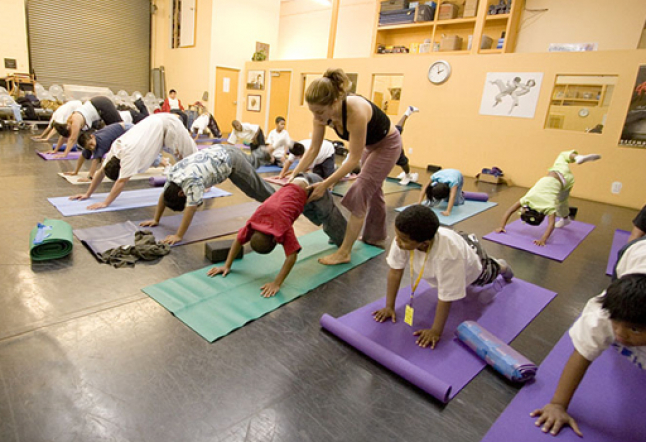a place called home

Welcome Home!
These days it seems you can’t walk down the street without seeing someone with their yoga mat under their arm, rushing off to attend their favorite yoga class. Yoga has become the “it” workout across the nation, and various formats, from Ashtanga to Hatha to Bikram are offered at gyms and studios in almost every neighborhood.
But while it is easy to imagine this scenario in most parts of the city, it would probably surprise many to know that one special “studio” with a dedicated following is located in notoriously violent and poverty-stricken South Central Los Angeles.
A Place Called Home (APCH) is a dynamic youth drop-in center that opened in South Central Los Angeles in 1993. Their mission statement reflects their holistic approach, “to provide at-risk youth with a secure, positive family environment where they can regain hope and belief, earn trust and self-respect and learn skills to lead to a productive lifestyle free of the gangs, drugs and poverty that surround them.”
APCH Founder Debrah Constance has been practicing yoga in Los Angeles for over 23 years, and currently teaches or supervises yoga four days a week in the dance studio of the Center.
It is now a common sight to see mothers in the area, walking down infamous Central Avenue to take their afternoon yoga class. In addition to the Center’s members, children ages 8 to 20 are able to attend her popular yoga classes, alongside local parents and the dedicated staff of APCH who benefit from the opportunity for an hour of serenity.
Begun humbly in the basement of a church, where 14 youth members gathered daily to play games with their friends, eat a nutritious snack, work on their homework, and receive informal mentoring from the staff and volunteers, APCH is now a thriving hub of activity.
The 15,000-square foot center, which APCH acquired in 1996 and expanded in 2002, is a “second home” and a source of inspiration and education to hundreds of youth daily.
Since 2001, teacher trainees from the much celebrated Ana Forrest Yoga Circle have volunteered to teach classes at the Center. And Bryan Kest, owner of the popular Power Yoga studios in Santa Monica taught yoga to the handful of original members in the basement of the church in 1993, and continues to donate $500 from the proceeds of one of his studio classes each month, totaling more than $50,000 to date.
Yet the community served by A Place Called Home continues to struggle on very basic levels. The 9th District of Los Angeles (which serves APCH) has the dubious distinction of having more youth in the criminal justice system than any other district in the city.
According to U.S. Census Bureau statistics, the 9th District also has the largest proportion of residents (40.3%) living in extreme poverty. It claims the highest proportion of residents (73.3%) living below 200% of poverty, and insofar as the district has the largest percentage of children and youth under the age 18, these poverty levels are all the more threatening. In fact, a full 81.1% of the district’s 85,391 children and youth live below 200% of poverty level.
In 2002, the American Academy of Pediatrics’ website featured an article regarding the impact of violence on children. According to their research, behaviors associated with children who have been victims of violence or have witnessed violence include withdrawal, lowered self-esteem, suicidal tendencies, and mental disorders, among many others.
Poor school performance is also common, as these youth often have difficulty paying attention. APCH addresses these issues through an array of programs and initiatives that encourage positive alternatives to the behaviors and lifestyles associated with poverty, unemployment, and low educational attainment.
For thousands of years, yoga has been proven to help people become healthy, happy and at peace with themselves. Yoga benefits at-risk youth living in the inner-city by providing a sense of inner peace and self-confidence, reducing stress and helping to control anger. These benefits may not only cause families to learn to communicate better, but may also help to reduce crime in stricken areas.
Read next >> ma:hi malas